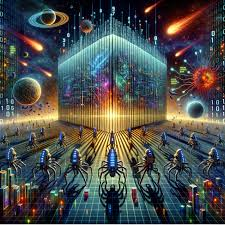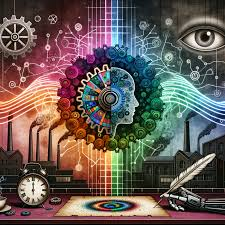Artificial intelligence (AI) is rapidly transforming our world, blurring the lines between science fiction and reality.
As this transformative technology continues its ascent, a critical question emerges: which professional discipline will reign supreme – engineering or marketing? This blog post argues that both specializations are indispensable in the quest for AI dominance, and their collaboration is the key to unlocking the technology's full potential.
Engineering and marketing are often seen as distinct disciplines, each with its own set of skills and priorities. Engineers are responsible for developing the underlying AI algorithms and technologies, ensuring they are robust, efficient, and scalable. On the other hand, marketers are tasked with understanding customer needs, identifying market trends, and creating compelling narratives to promote AI products and services.
While these disciplines may seem unrelated, they are in fact deeply intertwined when it comes to AI. Engineers cannot create successful AI solutions without understanding the needs and preferences of end-users, which is where marketers play a crucial role. Similarly, marketers cannot effectively promote AI products without a solid understanding of the underlying technology and its capabilities, which is where engineers come in.
The collaboration between engineering and marketing is essential for AI to reach its full potential. Engineers need to work closely with marketers to ensure that AI solutions are not only technically sound but also meet the needs and expectations of end-users. Likewise, marketers need to collaborate with engineers to develop compelling narratives that highlight the value of AI products and services in a way that resonates with customers.
Both engineering and marketing are essential for the success of AI. Rather than competing with each other, these disciplines should collaborate closely to ensure that AI reaches its full potential and continues to transform our world for the better. By working together, engineers and marketers can unlock new possibilities and drive the widespread adoption of AI across industries and sectors.
Quantifying the Workforce: A Challenging Endeavor
Pinpointing the exact number of engineering jobs compared to marketing jobs within the AI landscape is a complex task. Job titles can be multifaceted, and the skillsets often exhibit significant overlap. However, it's well-established that engineering roles currently form the backbone of AI development.
Engineers play a critical role in AI development by crafting intricate algorithms, designing specialized hardware, and developing software that powers AI systems. They are responsible for creating the technical foundation upon which AI applications are built and ensuring that these applications are robust, efficient, and scalable.
In contrast, marketing roles within the AI landscape focus more on promoting AI products and services, understanding customer needs, and creating compelling narratives that resonate with target audiences. While marketing is essential for the adoption and success of AI, engineering remains the driving force behind its development and innovation.
While the exact number of engineering jobs compared to marketing jobs in the AI landscape may vary, it's clear that engineering roles currently play a more significant role in shaping the future of AI. As AI continues to evolve, however, the balance between engineering and marketing roles may shift, with both disciplines playing increasingly important roles in the AI ecosystem.
The Indispensable Role of Engineers
Building the Cognitive Core: AI engineers are the masterminds behind the algorithms that power AI systems. Their expertise in machine learning, deep learning, and data science is fundamental for developing intelligent machines capable of learning and adapting.
Taming the Hardware Frontier: AI applications necessitate specialized hardware to function efficiently. Hardware engineers design and optimize processors, graphics processing units (GPUs), and other components specifically tailored to the demands of AI applications.
Constructing the Foundation: Software engineers create the frameworks and platforms that enable the development, deployment, and management of AI systems. Their work ensures the seamless integration of AI into various software applications.
The Marketing Mavens Emerge
While the brilliance of engineering is undeniable, AI dominance extends beyond the realm of technology – it necessitates seamless integration into the human experience. This is where the marketing vanguard comes to the forefront:
Understanding the Market Landscape: Marketers delve into user research, meticulously analyzing needs, preferences, and behavioral patterns. This invaluable insight guides the development of AI applications that address genuine user problems and provide tangible value.
A Symbiotic Dance: Engineering and Marketing in Harmony
Imagine a world-class athlete. Their raw talent and physical prowess (engineering) are undeniable assets. However, without a skilled coach (marketing) strategizing, training, and promoting them, their potential might remain unrealized. Similarly, AI thrives on the combined expertise of engineers and marketers.
Just as a coach plays a crucial role in guiding an athlete to success, marketers play a vital role in shaping the future of AI. Marketers are responsible for understanding market needs, identifying opportunities, and creating strategies to promote AI products and services effectively. They are the ones who communicate the value of AI to the world, helping to drive adoption and shape public perception.
On the other hand, engineers are the ones who build the foundation of AI, developing the algorithms, hardware, and software that power AI systems. They are responsible for ensuring that AI technologies are functional, reliable, and scalable. Without engineers, AI would not exist in its current form, and its potential would remain untapped.
Together, engineers and marketers form a powerful team that drives the innovation and adoption of AI. Engineers provide the technical expertise and innovation, while marketers provide the strategic direction and promotion. By working together, they can unlock the full potential of AI and drive its continued evolution and impact on society.
Just as a world-class athlete needs both raw talent and a skilled coach to succeed, AI thrives on the combined expertise of engineers and marketers. Together, they can shape the future of AI and unlock its full potential to transform industries and improve lives.
The Future of Work: A Collaborative Tapestry
As AI continues to evolve, the demand for both engineering and marketing expertise will undoubtedly escalate. Here's a glimpse into the future:
The Final Note: A Symphony, Not a Solo
While the current AI landscape might suggest an engineering dominance based on sheer numbers, the future belongs to collaboration. To achieve true AI dominance, we need the ingenuity of engineers harmonizing with the strategic vision of marketers. The perfect AI symphony requires a full orchestra, not a solo performance.
Engineering and marketing are both essential components of the AI ecosystem, each bringing unique strengths to the table. Engineers are the architects of AI, responsible for developing the algorithms, hardware, and software that power AI systems. Their technical expertise is critical for building robust and efficient AI solutions.
On the other hand, marketers play a crucial role in shaping the narrative around AI, promoting its benefits, and driving adoption. Their understanding of market trends and customer needs is essential for ensuring that AI technologies are relevant and impactful.
While engineers may currently dominate the AI landscape, the future lies in collaboration between engineers and marketers. By working together, they can create AI solutions that not only push the boundaries of technology but also resonate with customers and drive real-world impact.
Achieving true AI dominance requires a collaborative effort between engineers and marketers. By combining the ingenuity of engineers with the strategic vision of marketers, we can create AI solutions that are not only technically advanced but also commercially viable and socially beneficial.




